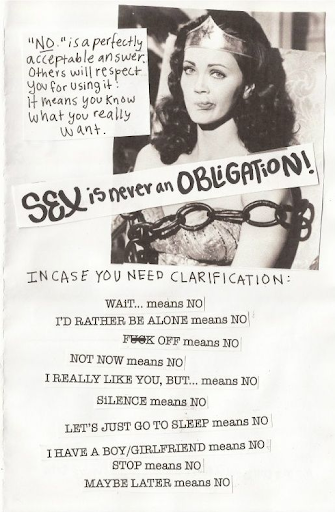NO CONSENT ≠ CRUELTY
In a country like India, marriage is looked at as a holy sacrament and less as a contractual relationship. Sexual activity is a sign of a happy and healthy relationship. However, this form of creative expression cannot be forced upon either of the partners. In this blog, we aim to analyze the importance of consent, especially in a matrimonial bond during intimacy. Corroborating the same with the help of some of the laws of our land.
Formally speaking, ‘Consent’ is synonymous with the idea of ‘autonomy’ and ‘free will’. It refers to the agency of individuals to make decisions without any coercion or pressure. Consent means a clear expression of willingness to participate in a sexual activity, either by words, gestures or any other form of verbal or non-verbal communication.

LEGAL BACKGROUND TO CONSENT FOR SEXUAL ACTIVITY UNDER MARRIAGE
Consent though can be tough to establish, has been defined in law, as follows:
- Explanation 2 of Section 375 of the Indian Penal Code, states that, “Consent means an unequivocal voluntary agreement when the woman communicates her willingness to participate in the specific sexual act via words, gestures, or any other form of verbal or nonverbal communication. – This section defines consent, especially for the offence of Rape.
- Section 90 of the Indian Penal Code (IPC) states that “Consent is not consent in the sense intended between section of this Code if it is given by a person under fear of injury or a misconception of fact, and the person doing the act knows or has reason to believe, that the consent was given as a result of such fear or misunderstanding.” – This section defines consent broadly though negatively.
IS MARRIAGE…… CONSENT?
walking from a legal standpoint, According to the current law (Exception 2, Section 375 of IPC), a wife is presumed to provide her perpetual consent to her husband by entering into marital relations with him. Therefore, sadly a husband cannot be held liable unless the husband and wife are separated or the wife is under 18 years of age.
This law presupposes consent under the purview of a legal marriage. It neglects the autonomy and dignity of a woman, while actively stripping away her right to consent, without an explanation for the exception in law. However, I believe that the idea of consent is perennial. It does not change with the changing nature of relationships. The importance of consent does not reduce, within a marriage. In the last few years, there has been a lot of discussion around consent, marriage and rape. Consent within marriage has been an ever-growing debate.
A major reason for this debate is the dichotomy between the public and private sphere, where the private sphere is shielded from the intervention of the law and its instrumentalities and to prevent “excessive interference with the institution of marriage”, the constitutional safeguards only exist for offenses against the state. Thus even in 2022, the Delhi High Court while considering the case of Marital Rape, gave a split verdict, where Justice Harishanker, while rejecting the plea to criminalise marital rape, propounded that a change in such a law would require legal, social, and cultural considerations.
No matter the legal connotations, consent is still imperative:
- Consent establishes a form of respect: respecting each other’s boundaries, talking about likes and dislikes, and asking for consent, is a sign of respect and care for between her. It shows that your partner can count on you to show that you care and respect them beyond what they offer sensually.
- Relieves trauma: In our lives, we many times face a traumatic sexual encounter or incident. If we have healed from that trauma or not, it becomes even more important for the other partner to ask for consent, to prevent the other partner from reliving their trauma once again.
- Open to expectation: Taking informed consent, helps get to know about your partner’s expectations from you and vice versa. For a healthy relationship, it is important to not impose or force your desires onto your loved one.
We all acknowledge that archaic institutions and structures of the state, that have been built with a set of norms and conventions, can be tough to change. However, the judiciary needs to reevaluate its position in society and the existence of certain laws in light of contemporary times.

CONCLUSION
Consent is important, married or not married! It is commonly assumed that a woman cannot be raped by her husband. This assumption stems from the fact that we cannot fathom a husband ‘raping’ his wife, since we see it as a gross violation of the sanctity of relationships which are supposed to be based on love and sentimental ties. But this does not negate the fact that it happens. Since time immemorial various thinkers have viewed marriage as a contract that requires the wives to have sexual intercourse, a contract they cannot retract. The “duty” of sex is equally distributed by law but it is more than obvious that it works to the advantage of men.
Consent is an important aspect of any relationship, including marriage. Because it upholds the principle of individual autonomy, respect and dignity. It is worth noticing that the concept of marriage has evolved with time. We have come from a time when even the direct consent of the individuals was not considered necessary. Today emphasis is on a consensual partnership, where the feelings and desires of both partners are considered imperative. This shift reflects a broader understanding of relationships as partnerships of equals, rather than arrangements dictated solely by tradition or external pressures.
We might not have a legal backing for this idea as of yet, however, a more social and cultural acceptance of consent in a matrimonial relationship can be achieved and strived for.
Author

